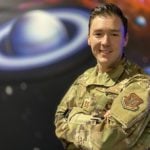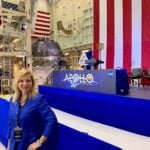Spotlight
Space Foundation Spends Summer Teaching Teachers to Teach Space
Written by: developer
The Space Foundation's summer is filled with rockets, cave-crawls, and swimming pool micrgravity simulations - all part of the various curricula for Space Discovery Institutes, which teach teachers how to use space to teach a broad range of subjects for elementary through high school sudents.
The summer kicked off with two consecutive weeks at the University of Nebraska at Omaha, where the Space Foundation partnered with the Omaha Public School District to offer Space Discovery Institutes to OPS teachers - and, for the first time, students. The first week was Biological and Physical Research: Long-term Space Travel and the second was Astronomy Principles for the Classroom: Kinesthetic Astronomy.
Now, the education team is back in Colorado Springs, teaching six Space Discovery Institutes to 100 elementary-school-through-high-school teachers from throughout Colorado, as well as Nebraska, Hawaii, Alaska, Virginia, Florida, New York, Arkansas, Missouri, and Texas. The classes include:
- Biological and Physical Research: International Space Station Science & Space Law (complete)
- Astronomy Principles for the Classroom: Exploring our Universe/The Search for Life (complete)
- Space Technologies in the Classroom: Nanotechnology and Space Spinoffs (July)
- Earth Systems Science: Planetary Geology (July)
- Lunar/Mars Exploration and Base Construction (July)
- Rocketry: Space History (July)
At the Biological and Physical Research: International Space Station Science and Space Law class, Charlie Lucy and Lizabeth Rodriguez from Holland & Hart law firm addressed space law and international trade regulations. Holland & Hart is a Space Foundation partner and an expert in space law. During the remainder of the week, participants learned about the science occurring on the International Space Station and how they could incorporate that science into their classrooms. One of the exercises challenged participants to create spacesuits for specific environments ranging from Mercury to Pluto to the moons of Saturn. Working in groups and using primarily items found around a typical home, the teachers came up with creative scientifically based designs that could - theoretically - withstand radiation, acid-based atmospheric conditions, ice, wind, darkness, and both high and low gravitational pull. The spacesuits they designed are pictured.
The second class, Astronomy Principles for the Classroom: Exploring Our Universe and the Search for Life was highlighted by a stargazing party, a field trip to Cave of the Winds to look at extremophile organisms, and a trip to Fountain Creek to search for macroinvertebrates using techniques similar to how astrobiologists will search for life on Mars.
The Space Foundation will hold no classes during the 4th of July week, but will resume the following week with classes in Colorado Springs. The education team will then finish the summer by holding six classes over a three week period for the Charles County, Md., school district. The Charles County School District is the first school that will hold all six of the Space Foundation's Space Discovery Institute classes during a single summer session.
One final week, called Earth Systems Science: Our Earth Revealed, will be held for Colorado Springs School District 11. Class participants will include the teachers from the new Jack Swigert Aerospace Academy (see related article n Space Watch)along with other middle school teachers from across the district.
The teachers who attend learn hands-on, minds-on activities and develop lesson plans that they can take back to the classroom. They also gain access to Space Foundation-provided teaching aids and additional lesson plans. The classes can be applied to several master's degree programs through both Regis University and the University of Colorado at Colorado Springs. The courses are developed and taught by Space Foundation educators, who are accredited teachers with additional space education credentials. The standards-based curriculum is designed to improve students' skills in science, technology, engineering, and mathematics (STEM) and to motivate them to continue to study STEM topics.
For more information, go to www.SpaceFoundation.org/Education/Content.
Photo: Teachers model spacesuits they created for multiple different space climates.
This article is part of Space Watch: July 2009 (Volume: 8, Issue: 7).


